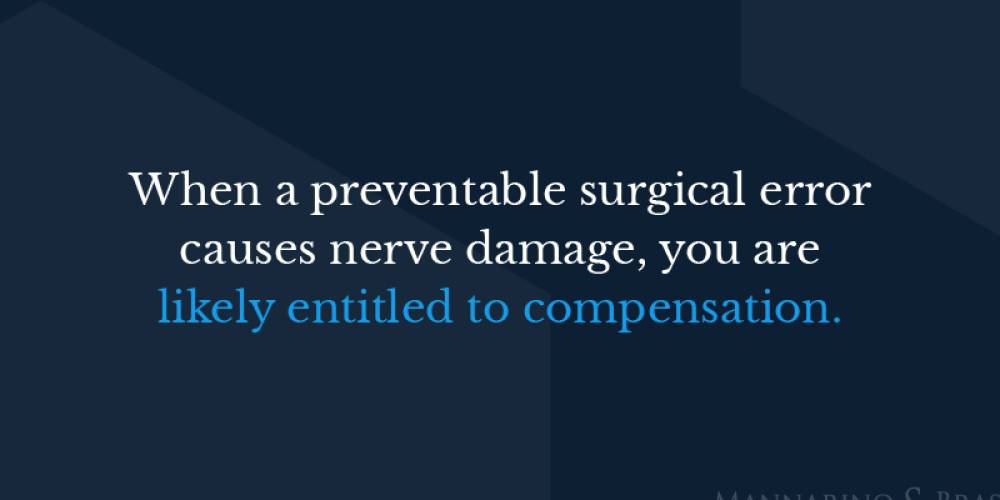If a Doctor Causes Nerve Damage in Surgery, Can I Sue?
 Did you know the human body contains more than 7 trillion nerves? From controlling muscles and body functions to sensing things like temperatures, pain, and pressure, each nerve has a function. Whether discussing a major nerve bundle or a tiny peripheral nerve, any nerve damage can have profound consequences.
Did you know the human body contains more than 7 trillion nerves? From controlling muscles and body functions to sensing things like temperatures, pain, and pressure, each nerve has a function. Whether discussing a major nerve bundle or a tiny peripheral nerve, any nerve damage can have profound consequences.
While nerve injuries often result from trauma like sports injuries or car accidents, surgeons can also cause nerve damage that significantly affects the patient’s life. If you suffered a nerve injury from a preventable surgical error, you may have a valid medical malpractice claim. Partnering with an experienced Winnebago, IL medical malpractice attorney can maximize your compensation.
What Are Motor, Sensory, and Autonomous Nerves?
Consider that the central nervous system, which consists of the spinal cord and brain, sends and receives messages constantly. Outgoing messages, transmitted through motor nerves, give instructions, such as to move your arm or keep it still. Incoming messages are sent from sensory nerves to inform the central nervous system of current conditions and stimuli, such as pain, heat, or vision. Autonomous nerves control involuntary bodily functions, including digestion, blood pressure, breathing, and other unconscious processes.
When any nerve is damaged during surgery, it can no longer perform its designated task. Patients can suffer from a wide range of symptoms resulting from inexcusable surgical errors.
What Are the Potential Consequences of Nerve Damage?
Nerve transection refers to the cutting or severing of nerves, either partially or totally. A damaged or completely severed nerve cannot function correctly and can have various consequences, depending on the nerve’s location and intended function. Nerve damage can produce a multitude of symptoms with varying degrees of severity, such as:
-
Muscle weakness
-
Tingling, burning, heaviness, or a cold sensation
-
Uncontrollable twitching
-
Sharp pains
-
Loss of feeling or extreme sensitivity to touch
-
Incontinence and sexual dysfunction
-
Loss of sight
-
Partial or total paralysis
-
Facial disfigurement
-
Atrophied muscles
Some of these conditions may have a greater impact on your life than others, but no amount of nerve damage caused by preventable surgical errors is acceptable. Surgeons, doctors, anesthesiologists, and all other medical professionals who fail to provide accepted standards of care can harm their patients, sometimes resulting in permanent conditions.
These patients may require lifelong medical care and assistance to perform everyday tasks, and they may also experience overwhelming pain and suffering. Holding the surgeon or other medical provider accountable through a medical malpractice claim not only offers financial compensation but can also give you the satisfaction of seeing justice done and hopefully ensuring the mistakes are not repeated in the future.
How Can Surgeons Damage Nerves?
During surgery, nerves could be transected by an unintentional or careless use of surgical instruments, such as a scalpel or clamps. Improper patient positioning during surgery can increase the likelihood of nerve transections. Inaccurate incisions and excessive force are other common causes of surgical nerve damage. Anesthesiologists who do not place a needle correctly could also damage nerves. All these errors can indicate medical negligence.
Nerve damage can occur during many commonly performed surgeries, such as C-sections, joint replacements, hernia repairs, and back surgeries. The location of the surgery and the nerves in that area determine which symptoms patients are likely to experience.
Avulsions are the most serious type of nerve injury, occurring when the nerve root is torn from the spinal cord. Repair and healing are not always possible, leaving the victim with permanent conditions that could include severe pain, partial or total loss of sensation or muscle function, and paralysis.
What Are Common Types of Surgical Nerve Damage?
The human body’s nervous system has several major nerves, pairs, and bundles connected directly to the spinal cord and brain. These are encased in and protected by the spine and skull. Peripheral nerves are smaller and branch out to the rest of the body from the primary nerves, and the peripheral nerves are more likely to be transected during surgery.
The brachial plexus, ulnar, and common peroneal nerves are especially vulnerable to injuries. However, damage to other nerves or nerve groups can also cause devastating impacts. Some of the nerves more frequently damaged during surgery include:
-
Brachial plexus nerves: Located in the shoulders, the brachial plexus is a networked nerve group that controls a person’s arms and hands.
-
Facial nerves: The facial nerve is what gives us the ability to move muscles to make facial expressions and produce tears. It is also connected to our sense of taste.
-
Sciatic nerves: As the body’s largest nerve, the sciatic nerve runs along the back of the leg from the foot to the lower back, controlling movement and providing sensation.
-
Common peroneal nerves: The common peroneal nerve is a branch of the sciatic nerve. It controls movement and enables sensation in the ankle, foot, and toes.
-
Laryngeal nerve: Located in the throat, the laryngeal nerves control the larynx, which is essential for speech, swallowing, and breathing.
-
The median/ulnar/radial nerves: This set of nerves controls forearm and hand movements, including the ability to grip. It also governs sensations felt by the hand.
Motor nerve damage can result in losing motor functions, meaning you may lose partial or total control of the affected muscles. For example, facial disfigurement is a distinct possibility with facial nerve injuries. Sensory nerve injuries can make you unable to feel both the affected area and anything you touch. Autonomous nerve damage can threaten your life.
When a preventable surgical error causes nerve damage, you are likely entitled to compensation. However, any medical malpractice case is complex, and you need to choose the right attorney to help you pursue all available damages.

How Can a Lawyer Help If I Have Nerve Damage Caused by Surgery?
Many people are intimidated by medical terminology and the various cause-and-effect issues involved with surgical errors and medical malpractice. Your damages are calculated using specific factors that are unique to your claim, and insurers know precisely how much your case is worth. Although your eligible damages are probably extremely high, the medical malpractice insurance company is likely to use confusing medical terms when explaining why they should not have to pay you or why they are only offering you a token amount.
You may be eligible to receive compensation for your lifelong medical expenses, lost income, ongoing care, and other costs that arise from the surgical nerve damage. In addition, you could secure damages for losing the ability to enjoy life, permanent disfigurement or disability, and additional intangible losses that diminish your quality of life.
When you choose Mannarino & Brasfield, A Division of Schwartz Jambois, you can rest assured that we know how to win even the most complex medical malpractice claims. We are not afraid of large insurance companies and will fight them aggressively to help you secure the full compensation you are entitled to.
Speak With an Experienced Rockford, IL Surgical Errors Lawyer Today
When a preventable surgical error leads to nerve damage, you deserve maximum compensation that fully addresses your many damages. Working with a highly effective Winnebago County, IL medical malpractice attorney from Mannarino & Brasfield, A Division of Schwartz Jambois increases your likelihood of receiving it. Call 815-215-7561 or contact us online now to arrange your complimentary case evaluation.



